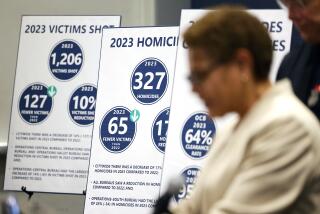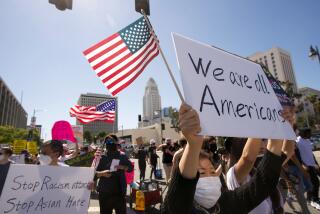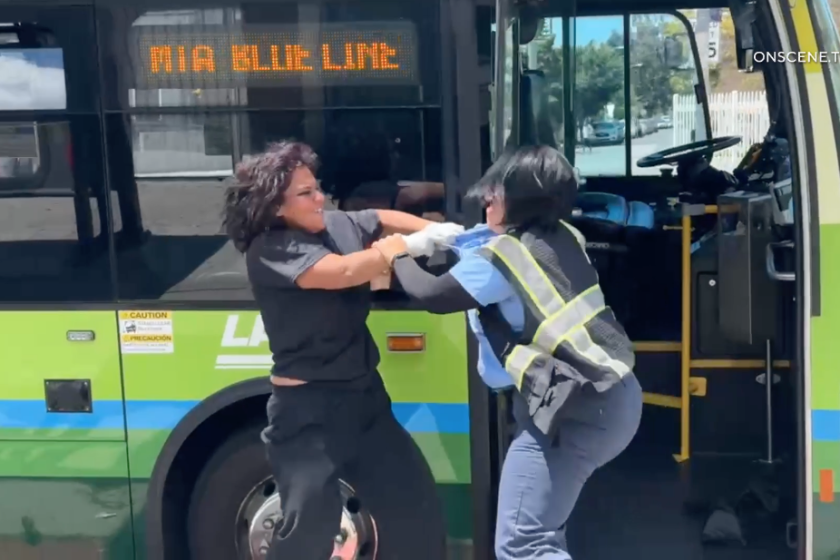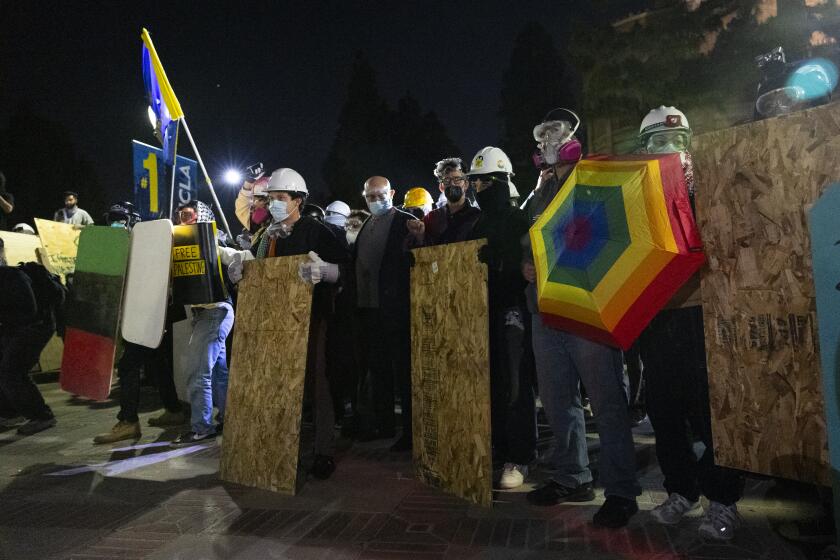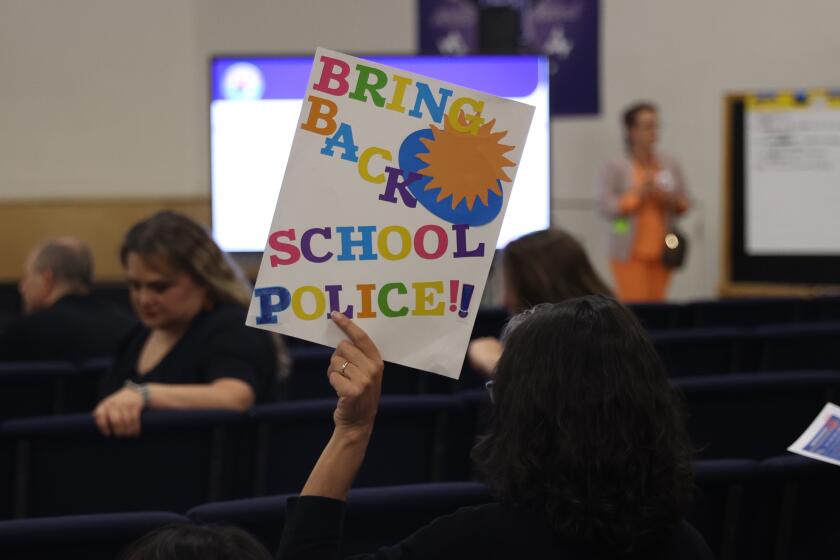4 of 10 in L.A. Know a Victim of Violence
In testimony to the far-reaching impact of violence in Los Angeles, four out of 10 residents say they personally know someone who has been seriously wounded or killed in an attack, according to a Los Angeles Times poll.
This includes one out of six adults in the city who claim to know someone who has been murdered.
Blacks and young adults were most likely to know a victim of violence, according to the poll. More than half of the blacks said they knew someone who had been shot, stabbed or otherwise seriously wounded or slain. The same was true of half of the adults ages 18 to 29.
Whites and the elderly were least likely to know a victim of serious violence.
Despite a decline in violent crime in the last few years, the poll indicated that fear of violence remains as high as it was after the rioting that followed the not guilty verdicts for police officers in the Rodney King beating.
A Times poll taken a month after the 1992 civil disturbances found that 50% of adults had made or planned to make changes in the way they lived because of concerns about violence.
In the latest poll, 52% said that, because of crime and violence, they had made or planned to make changes in the way they lived.
The poll attempted to gauge not only the perception but also the reality of the danger. Seven percent of the respondents said they or someone in their household had been the victim in the last year of a violent crime, such as homicide, rape, assault or robbery.
Another 7% said they or someone in their household had been the victim of a burglary or other theft in the last year.
This far exceeds the rate nationally. A Times poll last summer found that only 6% reported that someone in their household had been the victim of a property crime or a crime of violence in the previous year.
“Crime remains the major issue for residents in the city,” said acting Times Poll Director Susan Pinkus. “They are experiencing the violence. It is not just some thing that they watch on the local news or read in the newspaper.”
The poll, conducted from Jan. 29 to Feb. 2, consisted of telephone interviews with 1,143 adults in the city of Los Angeles. The margin of sampling error was plus or minus 3 percentage points.
The poll was taken amid a decline in reported incidents of violent crime. The Los Angeles Police Department, which has investigated between 800 and 1,000 slayings annually in recent years, reported 722 homicides in 1996.
Aggravated assaults, which typically involve serious but not fatal wounds, are much more frequent occurrences, but also have been on a downward trend. The LAPD investigated 35,000 aggravated assaults last year, compared to 40,000 in 1994.
LAPD Deputy Chief John White said recently that overall reported serious crimes, including thefts as well as crimes of violence, have decreased by 30% in the city over five years. But White recently warned the Police Commission that the decline in violent crimes may not last. He cited demographic forecasts of a boom in the population of young males, traditionally the most violent group.
The poll questions about violence followed a Times study on how homicides are investigated and prosecuted in Los Angeles County. The city accounts for half the homicides in the county.
The study of five years of homicides concluded that detectives and prosecutors are overwhelmed by too many killings and are operating ineffectively. Only one in three killings leads to a homicide conviction.
The study found that homicides were more likely to be solved and successfully prosecuted in some parts of the county than others. Crimes involving white victims were more likely to be solved than crimes involving Latino or black victims.
Police officials said those differences were not the result of the victims’ race, but said that one major difference could be the willingness of witnesses to come forward and cooperate.
The poll shows sharp differences from neighborhood to neighborhood regarding the willingness of residents to cooperate with authorities.
In South Los Angeles, only half the respondents said they would be willing to cooperate with police and testify if they saw a murder. In contrast, in the San Fernando Valley and on the Westside, at least three in four residents said they would be willing to cooperate.
More than 40% of homicides in Los Angeles County now are considered gang-related, and these are among the hardest to solve. Police say it is particularly difficult to find willing witnesses in gang cases because of the fear of retaliation.
When respondents were asked whether they would cooperate if they had witnessed a gang-related killing, the percentages of those who said they would cooperate dropped precipitously--to 58% each on the Westside and in the San Fernando Valley.
There was a less dramatic drop--from 51% to 45%--in South Los Angeles, indicating that people there are somewhat less likely to cooperate with police, regardless of whether the killing is gang-related. In Central Los Angeles, it dropped from 67% to 55%.
Follow-up interviews with respondents suggested that residents are more fearful in neighborhoods with higher crime rates and are less certain that the police could protect cooperating witnesses.
One who said she doubted she would be willing to be a witness was Claudette Hill, the owner of a small business. Even though she described her Crenshaw-area neighborhood as relatively quiet, Hill said, “I am still scared; scared to go out at night, scared to do anything.”
She said the situation has deteriorated in the past 10 years throughout the city. “My daughter used to ride the bus” alone in first grade, Hill said. “Now, my 12-year-old daughter rides the bus, and I am so afraid for her.”
Hill said she would be unlikely to come forward whether or not the killing was gang-related.
“People are crazy,” she said, “and you don’t know what they’ll do.” She said she would like to think that she could call the police anonymously to help them, without having to get involved.
In Pacific Palisades, Janet Davis said she thought she would be willing to come forward if she saw a murder. “I’d try to be responsible,” she said. “But I feel secure in my neighborhood.”
Davis was among those who said she doubted she would still be willing to testify if the murder was gang-related. But in the follow-up interview, she explained that response was really hypothetical since the threat of gang violence in her neighborhood seems remote.
Los Angeles has among the fewest police officers per capita of any major city in the country. Expanding the department has been a primary goal of Mayor Richard Riordan. Since Riordan took office, the department has expanded from 7,600 to 9,200 sworn officers.
Residents told the poll by a 2-to-1 margin that they believe spending to correct social ills will do more to lower the crime rate than hiring more police and building more prisons.
Sixty-one percent prescribed a focus on improving education and job training, compared with 31% who said increased spending on law enforcement was the key. The remainder were not sure or refused to answer.
How the Poll Was Conducted
The Times Poll contacted 1,143 adults in the city of Los Angeles by telephone Jan. 29 through Feb. 2. Telephone numbers were chosen from a list of all exchanges citywide. Random-digit dialing techniques were used so that listed and unlisted numbers could be contacted. The sample was weighted slightly to conform with census figures for sex, race, age, education and area of city. The margin of sampling error for all adults is plus or minus 3 percentage points; for certain subgroups the error margin may be somewhat higher. Poll results can also be affected by other factors, such as question wording and the order in which questions are presented.
(BEGIN TEXT OF INFOBOX / INFOGRAPHIC)
Someone You Know
* Do you personally know anyone who has been shot, stabbed, seriously wounded or murdered in Los Angeles?
*--*
All White Black Latino No One 58% 60% 45% 60% Shot/Stabbed/ Seriously Wounded 22 19 27 24 Murdered 17 15 27 14 Don’t Know 3 6 1 2
*--*
Getting Involved
Roughly two-thirds of L.A. residents would come forward to testify
if they witnessed a crime. But the number of people who would come forward if gang members are involved drops substantially.
* Let’s say you witnessed a murder. Would you come forward to cooperate with the police and testify in court, or wouldn’t you want to become involved?
*--*
All White Black Latino Come forward 68% 80% 67% 55% No involvement 15 8 16 23 Depends 13 8 10 20 Don’t Know 4 4 7 2
*--*
* Let’s say you witnessed a gang killing. Which of the following comes closer to how you feel?
*--*
All White Black Latino Would come forward/ Feel police could protect me 23% 27% 20% 19% Would come forward/ Feel police couldn’t protect me 31 34 33 30 Would not come forward/ Feel police could protect me 5 4 13 4 Would not come forward/ Feel police couldn’t protect me 27 23 25 27 Don’t know 14 12 9
*--*
Sources: L.A. Times Poll
Times Poll data can also be accessed on the World Wide Web at https://www.latimes.com/HOME/NEWS/POLLS/
More to Read
Start your day right
Sign up for Essential California for news, features and recommendations from the L.A. Times and beyond in your inbox six days a week.
You may occasionally receive promotional content from the Los Angeles Times.
